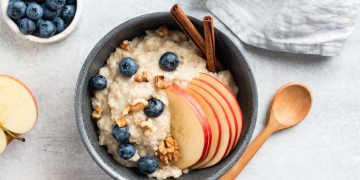In today’s fast-paced world, meal planning has become a crucial aspect of maintaining a healthy lifestyle. Busy schedules often make it challenging to eat well-balanced meals regularly. However, with the right strategies and tips, even the busiest individuals can stay on track with their nutrition goals. In this ultimate guide to effective meal planning for busy lives, we will explore various techniques and suggestions to help you succeed in meal planning and achieve optimal health.
Why Meal Planning is Important
Meal planning is essential for several reasons. Firstly, it helps you save time and money by reducing the impulse to eat out or order takeout. By planning and preparing your meals in advance, you can avoid last-minute decisions that may lead to unhealthy food choices. Additionally, meal planning allows you to ensure that you are getting the nutrients your body needs to thrive. By taking the time to plan your meals, you can incorporate a variety of fruits, vegetables, lean proteins, and whole grains into your diet.
Strategies for Effective Meal Planning
1. Set Aside Time Each Week
One of the keys to successful meal planning is setting aside dedicated time each week to plan your meals. Choose a day that works best for you, whether it’s Sunday afternoon or a weeknight after work. Use this time to create a meal plan for the week ahead, make a grocery list, and prep ingredients for easy meal assembly.
2. Keep It Simple
When planning your meals, aim for simplicity. Choose recipes that are quick and easy to prepare, especially on busy weekdays. Consider one-pot meals, sheet pan dinners, or make-ahead breakfasts that can be easily reheated throughout the week. By keeping your meals simple, you can save time and reduce stress in the kitchen.
3. Batch Cook
Batch cooking is a great time-saving strategy for busy individuals. Take advantage of weekends or evenings to prepare large batches of a few different dishes that can be portioned out and stored for future meals. Batch cooking can help you save time during the week and ensure that you always have healthy options on hand.
4. Make a Grocery List
Before heading to the store, make a detailed grocery list based on your meal plan. This will help you stay organized and focused while shopping, preventing you from making impulse purchases. Consider organizing your grocery list by section (produce, dairy, pantry items, etc.) to make your trip more efficient.
5. Utilize Frozen and Canned Foods
Frozen and canned foods can be lifesavers for busy individuals. Keep your pantry stocked with frozen vegetables, fruits, and proteins that can be easily incorporated into meals. Canned beans, tomatoes, and tuna are also great pantry staples that can add nutrition and flavor to your dishes.
Tips for Success
1. Invest in Quality Food Storage Containers
Having the right food storage containers can make a big difference in meal planning success. Invest in high-quality containers that are durable, leak-proof, and easy to stack in the fridge or freezer. Look for containers that are microwave and dishwasher-safe for added convenience.
2. Make a Meal Prep Schedule
Create a meal prep schedule to help you stay organized and efficient in the kitchen. Allocate specific days and times for meal planning, grocery shopping, meal prep, and cooking. By following a schedule, you can ensure that you have everything you need for a successful week of meals.
3. Customize Your Meal Plan
Tailor your meal plan to fit your personal preferences and dietary needs. Consider factors such as food allergies, intolerances, or specific dietary goals when planning your meals. Experiment with different recipes and ingredients to keep your meals exciting and enjoyable.
4. Stay Flexible
It’s important to remember that meal planning is not set in stone. Life happens, and schedules can change unexpectedly. Be flexible with your meal plan and have backup options in case your plans are disrupted. Consider keeping a few quick and easy meal ideas on hand for those hectic days.
5. Get Creative
Meal planning doesn’t have to be boring or repetitive. Get creative with your meal ideas and experiment with new ingredients and flavors. Try new recipes, cuisines, and cooking techniques to keep your meals exciting and varied. Cooking can be a fun and rewarding experience when you allow yourself to be adventurous in the kitchen.
Common Questions About Meal Planning
1. Is meal planning suitable for everyone?
Yes, meal planning is beneficial for everyone, regardless of their schedule or lifestyle. Whether you’re a busy professional, student, parent, or athlete, meal planning can help you stay on track with your nutrition goals and maintain a healthy lifestyle.
2. How do I start meal planning if I’m a beginner?
If you’re new to meal planning, start by setting aside dedicated time each week to plan your meals. Begin with simple recipes and gradually build your skills and confidence in the kitchen. Don’t be afraid to experiment with different ingredients and flavors to find what works best for you.
3. How do I avoid food waste when meal planning?
To avoid food waste, plan your meals based on what you already have in your pantry, fridge, and freezer. Use leftovers creatively in future meals or incorporate them into soups, salads, or stir-fries. Consider freezing extra portions for later use or repurposing ingredients in new dishes.
4. Can I meal plan on a budget?
Yes, meal planning can be done on a budget. Look for sales, discounts, and coupons when shopping for groceries. Buy in bulk when possible, and consider incorporating budget-friendly ingredients such as beans, lentils, rice, and seasonal produce into your meals. Be mindful of portion sizes to reduce food waste and save money.
5. How can I incorporate variety into my meal plan?
To add variety to your meal plan, experiment with different recipes, cuisines, and cooking techniques. Rotate your protein sources, grains, and vegetables to keep your meals interesting. Consider trying new ingredients or challenging yourself to cook dishes from different cultures. Don’t be afraid to step out of your comfort zone and get creative in the kitchen.
Conclusion
In conclusion, effective meal planning is a valuable tool for busy individuals looking to maintain a healthy lifestyle. By incorporating strategies such as setting aside dedicated time each week, keeping meals simple, batch cooking, and making a grocery list, you can succeed in meal planning and achieve your nutrition goals. Remember to stay flexible, get creative, and tailor your meal plan to fit your personal preferences and dietary needs. With a little planning and organization, you can enjoy delicious, nutritious meals while saving time and money. Start meal planning today and take control of your health and well-being.












































